Bringing nature indoors has long been associated with positive energy and well-being, and certain plants are believed to bring luck, prosperity, and harmony into your home. From enhancing your space’s aesthetic appeal to improving air quality, these lucky plants can also create a calming environment while attracting good fortune. Whether you’re seeking financial growth, improved health, or happiness, adding these plants to your living space might just tip the scales of luck in your favour. Here are some of the most popular lucky plants you can welcome into your home for a touch of natural good vibes.
“Auspicious plants for home dispel the stagnant and stale energies from the home. They subconsciously connect us to the colour green, which has therapeutic qualities. According to Vastu Shastra, healthy growing plants and plants that bring money and good luck placed in the right directions, enhance the ability to attract abundance into one’s life and improve relationships,” says Nitien Parmar of Vastu Plus, Mumbai.

List of lucky plants for home
Check this list of some of the best plants for home to bring good luck and prosperity.
Lucky plants #1: Tulsi
According to Vastu shastra, one of the most powerful, sacred and auspicious good luck plants that enhances positivity at home, is the Tulsi or holy basil.
“This shrub, which has great medicinal value, can purify the atmosphere and keep mosquitoes away. Tulsi can be grown at the front or the back of the house, in the balcony or windows, wherever it can be exposed regularly to sunlight,” says Parmar.

Also read: Which Tulsi is best for home
Good luck plants for home #2: Jade plant
Jade plant, with its small rounded leaf, is known to be a lucky plant. According to Feng Shui, the Jade plant is the epitome of good luck and favourable positive energy and hence, this good luck plants for home can be placed in the house or office. Jade symbolises growth and regeneration and the shape of the leaves of the lucky plant for home bear a resemblance to jade stones. However, avoid keeping the jade plant in the bathroom, experts suggest. Crassula ovata is the scientific name of the Jade plant.
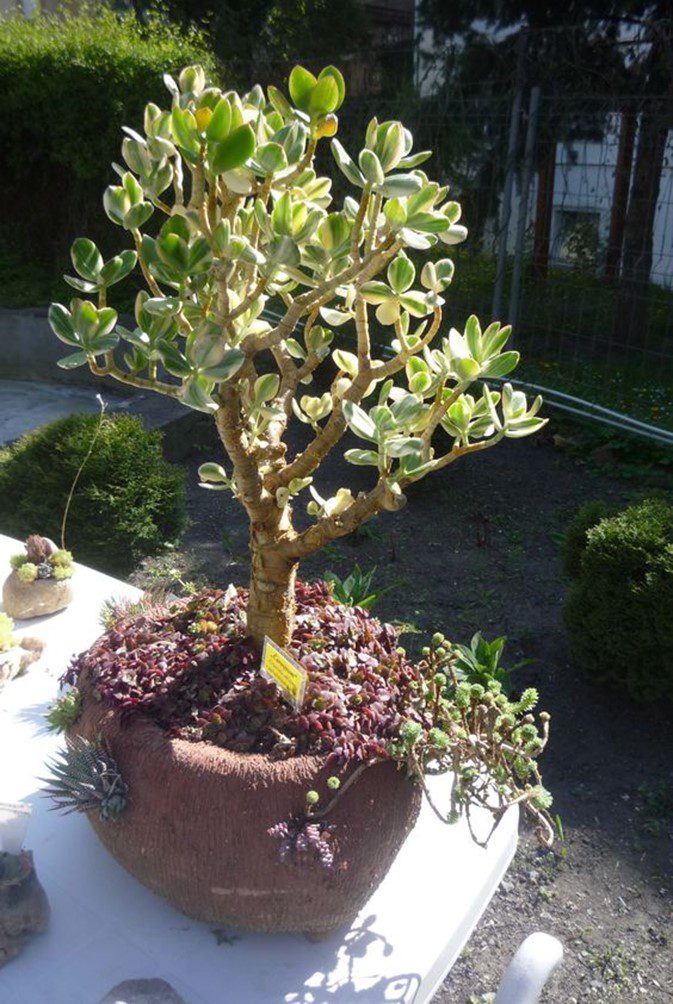
Lucky plants for home #3: Lucky bamboo
The good luck plant- bamboo (Dracaena Sanderiana) from south-east Asia and both, Vastu and Feng Shui, associate it with good fortune and health. The number of stalks in the good luck plant has a big impact on the meaning of a particular lucky bamboo plant. For wealth, for instance, it should have five stalks; for good luck six; seven stalks for health and 21 stalks for health and great wealth. Bamboo good luck plants for home also act as air purifiers and remove pollutants from the surroundings. Preferably, keep the bamboo plant in the east corner.

Also read all about lucky bamboo benefits for home
Lucky plants #4: Money plant
Money plant (pothos) is known to bring wealth and good luck to the house and helps in overcoming financial obstacles. Money plants act as natural air purifiers, as they filter the toxins out of the air. These good luck plants require very little maintenance. It is said that keeping a money plant at home can help to achieve success in both, personal and professional fields.
The scientific name of the money tree, a symbol of fortune, is Pachira aquatica.

Source: Pinterest
Also read all about Vastu for Money plant direction
Good luck plants for home #5: Areca palm
Areca palm plants, according to Feng Shui, lead to health, peace and prosperity. These lucky plants for a home eliminates negative energy and attracts positivity. This leafy plant can be grown anywhere in the house, in indirect sunlight. These good luck plants for home have an ability to remove common pollutants from the air and also improves humidity.

Source: Pinterest
Lucky plants for home # 6: Rubber plant
Rubber plants are considered lucky plants for home and represent wealth and fortune in Feng Shui, as its rounded leaves resemble coins. When placed in the home, these good luck plants are believed to provide abundance. Also, the rubber plant improves indoor air, as it is a natural air purifier. The scientific name of the rubber plant is Ficus elastica.
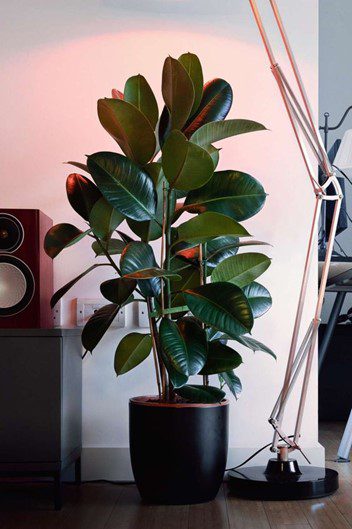
Source: Pinterest
Lucky plants #7: Fortune plant/Corn plant
Corn plants or Fortune plants (dracaena fragrans) are well-known indoor plants for good luck. In some Asian countries, the corn plant is said to be a symbol of luck. If the plant blooms at home, it means one will receive wealth and fortune. Corn plants purify the air as they remove toxins from the air. Corn plants thrive in bright yet indirect light.

Source: Pinterest
See also: Best indoor plants for small rooms and apartments
Good luck plants for home #8: Lavender
Lavender, known by its scientific name, Lavandula, is an aromatic plant with many therapeutic benefits. Since it has soothing properties, it is used in aromatherapy. Lavender flower and Lavender oil are used in making scent and medicines. It is among the lucky plants ideal to be kept in front of the house or any outdoor space.
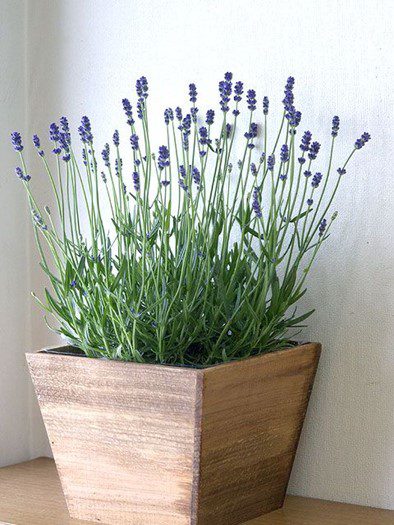
Source: Pinterest
Lucky plants for home #9: Eucalyptus
Eucalyptus, the scientific name of which is Eucalyptus globulus, is one of the plants that bring good luck. The leaves and oil of eucalyptus have medicinal properties. Keeping this plant at home will elevate the positive energies in the house.
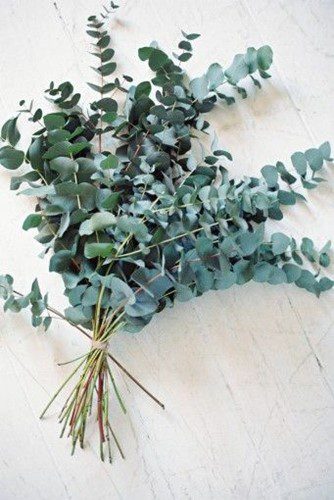
Source: Pinterest
Lucky plants #10: Snake Plant
Among other lucky plants which are good for home is the Snake plant. This auspicious plant is known to purify the environment by absorbing the toxins and reducing the allergens present in the air. This plant grows well in different conditions.
Sansevieria trifasciata is the scientific name of the Snake plant.
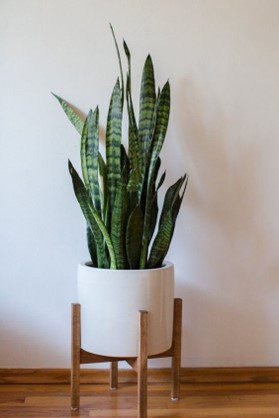
Source: Pinterest
Good luck plants for home #11: Golden Pothos
Golden Pothos is a variety of money plant and it is considered to be a good luck plant. As per Feng Shui, it is among the auspicious plants for home that bring wealth. Moreover, it is also beneficial in minimising the negative energy and anxiety levels. You can grow these plants outdoors or indoor areas, including the bathroom.
The scientific name of Golden Pothos is Epipremnum aureum.

Lucky plants for home #12: Peepal Bonsai
The Peepal bonsai plant, also referred to by its scientific name Ficus religiosa, is a sacred houseplant as per the Hindu tradition. In Buddhism too, the plant has a great significance as Gautama Buddha attained enlightenment when meditating below a Peepal tree.
The Peepal bonsai is considered a lucky plant and represents good fortune, happiness, and longevity. The fig tree can grow tall and has aerial roots. They can also be grown in pots for bonsai.
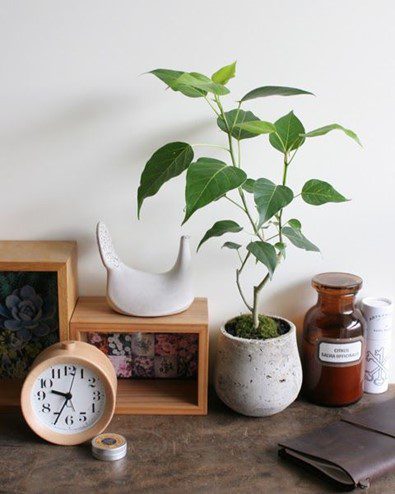
Source: Pinterest
Lucky plants #13: Ginseng Ficus
The scientific name of Ginseng Ficus is Ficus retusa, a popular choice for bonsai. It is a variety of fig tree found in Southeast Asia. The good luck plant has dark green, oval-shaped leaves and thick roots that grow above the soil. These features give a distinct appearance to the plant. The tree serves as an air purifier and helps reduce indoor pollutants. As per Feng Shui, Ginseng Ficus brings good luck and harmony in the house.
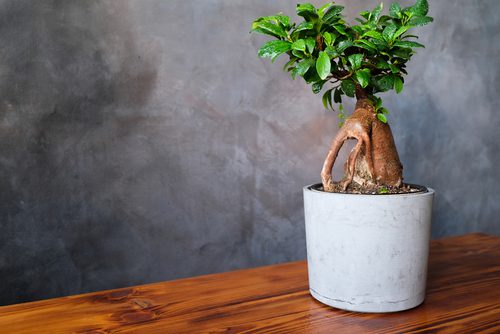
Good luck plants for home #14: Citrus trees
Growing citrus plants and trees at home is considered lucky. The more fruits the tree contains, the luckier it is believed to be. Most citrus fruits are round-shaped and golden coloured, symbolising coins for wealth. Citrus trees grown in pots, which look attractive with a pleasant fragrance, are popular gift items for celebrating the Chinese Spring Festival.
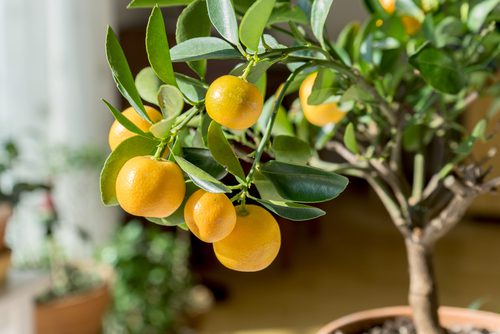
Lucky plants for home #15: Adenium
Adenium, with the scientific name Adenium obesum, is one of the good luck plants for home. In Chinese culture, Adenium is also called as the wealth plant, and used widely for the Chinese Spring Festival celebrations. It is among the lucky plants for indoors, mainly because of their swollen roots that denote abundance and fertility. Adenium plants are known for their beautiful pink or red flowers, known as desert rose, which are regarded to bring good luck.
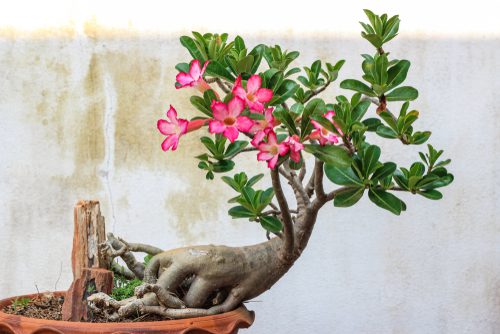
Lucky plants #16: Pitcher Plant
The pitcher plant is one of the auspicious plants for home and represents long-term wealth. In Chinese, the pitcher plant is referred by a name that translates to bags of safety or peace. The scientific name of pitcher plant is Nepenthes. It has large, pitcher-like leaves and looks like bags. The plant is also used for home décor to attract positive energies and prosperity in the house.
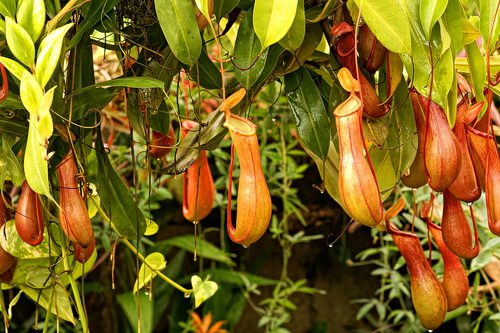
Good luck plants for home #17: Peace lily
Peace lilies are a great addition to any room, to help clean the air and evoke a sense of harmony. Feng Shui says that nurturing peace lilies, help to bring about good luck and affluence and it wards off negative energies. Since the plant attracts good vibes, this lucky plant is also good for emotional wellbeing. This good luck plant improves the flow of energy in the home by cleansing the air.

Source: Pinterest
Lucky plants for home #18: Jasmine
Jasmine represents appreciation, love and good luck and creates positivity in relationships. Jasmine (mogra) has a delicate sweet fragrance and this good luck plant for home is known to reduce anxiety and bring tranquillity. “In today’s chaotic world, one needs a calm and peaceful home to recharge and plants help us to relax. I have jasmine flowers on my balcony, which are the favourite flowers of Lord Shiva. After a day’s work, I enjoy the delicate whiff of blooming jasmine on my balcony and forget all the stress,” says Srilata Krishnan from Mumbai.

Source: Pinterest
Lucky plants #19: Orchid
Orchids, known by their scientific name Orchidaceae, are good luck flowers for home and are associated with good luck and prosperity. In Feng Shui, orchids symbolise good relationships, happiness and fertility. Ideally, these good luck flowers for home should be placed in the north direction.

Source: Pinterest
Good luck plants for home #20: Lotus
Lotus is a symbol of wealth, peace, purity, harmony and spirituality. These good luck flowers for home also have medicinal value and are considered an auspicious flower as it is linked with Goddess Lakshmi, as well as Lord Buddha. Placing it in front of the house is most beneficial but these good luck flowers for home can be kept inside the house too. A water pond with lotus in it, is ideal in the north-east or north or east direction of one’s garden.

Source: Pinterest
Lucky plants for home #21: Marigold
According to Vastu, yellow marigold flowers symbolise good fortune and optimism. These good luck flowers for home attract positivity and energy into one’s home. Marigold flowers are considered auspicious and are placed on the main door, as torans. A north or east direction is the best to keep marigold plants in your home.

Source: Pinterest
Lucky plants #22: Peonies
Peonies signify good luck, fertility, prosperity and blessings. To boost luck and enhance the relationship quotient in your lives, place this good luck plant in the south-west direction of the garden. The scientific name of the peony is Paeonia.

Source: Pinterest
Good luck plants for home #23: Chrysanthemum
The yellow Chrysanthemum flower, according to Vastu Shastra, represents cheerfulness and optimism. These good luck flowers for home attract positivity. It also purifies the air and removes toxins from the home. In Buddhist culture, the altar is often decked with chrysanthemum. One can keep these good luck flowers for home in the living room but avoid placing it in the bedroom.

Source: Pinterest
Lucky plants for home #24: Hibiscus
The red hibiscus is associated with divinity, as it is offered to goddess Kali and lord Ganesha. You can grow these Vastu plants for home on a sunny window or garden, for positive energy, stability and joy in life. Yellow hibiscus is ideal for lifting one’s spirits, bringing good fortune into your home and thus considered as lucky plants for home in India. The hibiscus plant vastu direction is either the north or east.

Source: Pinterest
Lucky plants #25: Rose
Roses signify love and passion and attract good luck and healing energy. It is considered as a Feng Shui lucky plant for home. Red roses signify love, yellow brings happiness, and white roses symbolise peace. The fragrance of rose reduces anxiety and brings in a feeling of peace. Rose is the only thorny plant which Vastu Shasta states is suitable to grow within a home. According to Vastu Shastra, rose flower plants placed in the south-west are auspicious, as it removes negative energy and enhances social eminence of the house owner.

Source: Pinterest
Good luck plants for home #26: Magnolia (champak flower)
Planting a magnolia tree in the garden at home can help people get contentment. These are said to be lucky plants for home in India with a fragrance (cream, light pink, light orange-yellow colour) that attracts prosperity. The tree has the ability to bloom even after being uprooted. In many cultures, the magnolia flower symbolises economic stability, joy, good luck and perseverance.

Source: Pinterest
Lucky plants for home #27: Mint
This herb keeps bad vibes away and is ideal for attracting wealth and prosperity. The aroma of mint leaves helps calm one’s nerves and is believed to revive one’s hopes. It also helps in relieving strained muscles and has medicinal value.
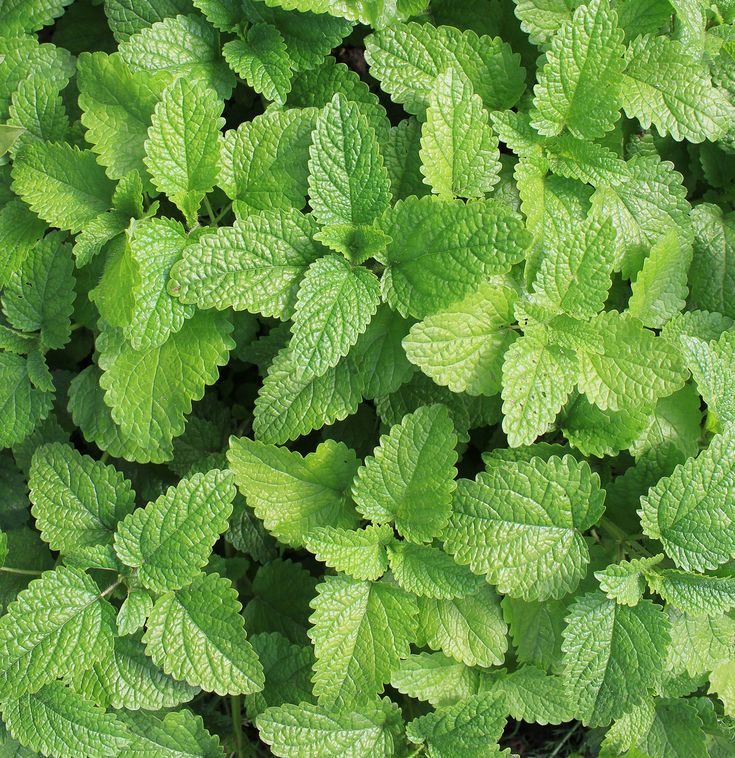
Source: Pinterest
Lucky plants #28: Sage
Sage is known to ward off evil and has cleansing qualities.According to Feng Shui, the sage plant helps in removing negative energies at home. It also has medicinal properties and a strong aroma.

Source: Pinterest
Good luck plants for home #29: Ajwain (carom)
This herbal plant is considered auspicious for wealth. It does not require too much sunlight or water. The beautiful ribbed leaves of the plant are edible and an easy home remedy for an upset stomach.

Source: Pinterest
Lucky plants for home #30: Ginger
In recent times, many people are opting to consume ginger tea, as it is known to give relief from cold. Ginger has been used for cooking and medicinal purposes since ancient times. Growing ginger, the healing herb, at home, helps to enhance love and attract wealth and fortune.

Source: Pinterest
Lucky plants #31: Thyme
Thyme plants can help in luck related to career. This aromatic herb brings good luck to those wishing for a new job, promotion, or commencing a business. Thyme enhances monetary luck. So, grow it in your kitchen garden.
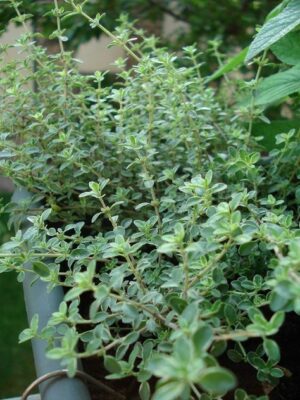
Source: Pinterest
Good luck plants for home #32: Bay laurel
An evergreen aromatic plant, Bay laurel symbolises wisdom, (acquired and intuitive) and also a victory. The leaves are usually placed at the entrance of houses to avoid curses and attract happiness and prosperity in the home. The plant strengthens the good energy at home and balances emotions. It has curative properties and is also widely used in cooking. Bay Laurel can be grown indoors in pots, and outdoors as shrubs and also as trees.
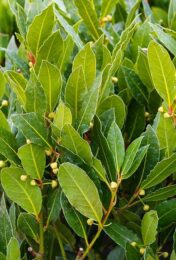
Source: Pinterest
Lucky plants for home #33: Lemon balm
Lemon balm is said to reduce stress, help you to relax, and boost your mood. The zesty lemon balm is used in traditional medicine as a sleep aid and digestive tonic. According to Feng shui, lemon balm attracts peace and prosperity.

Source: Pinterest
See also: 6 Herbs For Your Kitchen Garden
Lucky plants #34: Neem tree
Neem tree creates positivity, a healthy environment and according to Vastu, is auspicious. As it has great medicinal value, the Vedas called the Neem as sarva roga nivarini (the cure of all ailments). Neem trees act as an efficient natural air filter, absorbing pollutants.
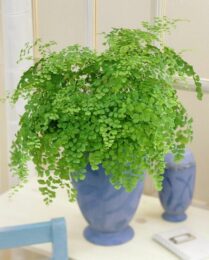
Source: Pinterest
Good luck plants for home #35: Banana
The banana plant is a sacred plant worshipped in India. It is considered a harbinger of good luck and signifies prosperity, good health and mental peace. This plant should be placed in the north-east.

Source: Pinterest
Lucky plants for home #36: Coconut tree
The coconut tree, which is called the ‘kalpavriksh’ or the sacred tree, is said to fulfil all desires and bring good fortune and positive energy. The ideal direction to plant it is in the south or south-west.

Source: Pinterest
Lucky plants #37: Ashoka tree
Ashoka, the evergreen tree with fragrant flowers, is believed to remove suffering and bring joy. This ‘tree of happiness’ brings positive energy and prosperity.

Source: Pinterest
Good luck plants for home #38: Jack fruit tree
Do not grow this tree in the north direction of the house. Instead, plant it in the south, south-west, or north-west direction, for good health and positivity.

Source: Pinterest
Lucky plants for home #39: Amla tree
Indian gooseberry or amla, according to Vastu, is a lucky tree. The tree is considered sacred and is said to be the favourite of Lakshmi, the goddess of wealth and Lord Vishnu. This can be planted in the North East or East, but at a little distance from the house. Amla which is rich in Vitamin C is known for its various health benefits.

Source: Pinterest
Lucky plants #40: Tangerine tree
Opting for a tangerine tree is a splendid choice for those with ample space in their homes, as it is believed to usher in prosperity and tranquillity. The fruit of this auspicious plant bears a striking resemblance to golden coins adorning a tree. It is considered inauspicious to decline a gifted tangerine tree, as it implies rejecting the incoming fortune and abundance. These indoor fruit trees should be housed in moderate environmental conditions, avoiding excessive heat or cold, and should receive a minimum of four hours of sunlight. Additionally, they should be watered once a week to thrive.

Source: Pinterest
Good luck plants for home #41: Fittonia
Known as nerve plants, Fittonia stands out with vibrant pink or white veins against dark leaves. Beyond their visual appeal, these lucky plants symbolise growth and renewal, emitting positive energy. Ideal for terrariums or bathrooms with indirect sunlight, Fittonia thrives as a low-light indoor plant, requiring regular watering to flourish.
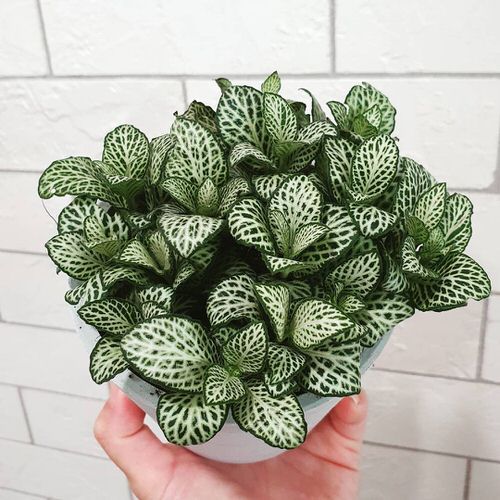
Source: Balcony Garden Web (Pinterest)
Lucky plants for home #42: Ivy
A superb air filter, Ivy graces coffee shops for its purifying qualities. Highlighted by Hyder for symbolising friendship and patience, Ivy securely attaches itself to objects. This lucky plant not only brings happiness and positivity but also restores energy. Thriving in low-light conditions, Ivy effortlessly revitalises spaces with limited energy flow, making it perfect for uplifting areas like cabinet tops and secluded corners, enhancing the positivity of your living space.
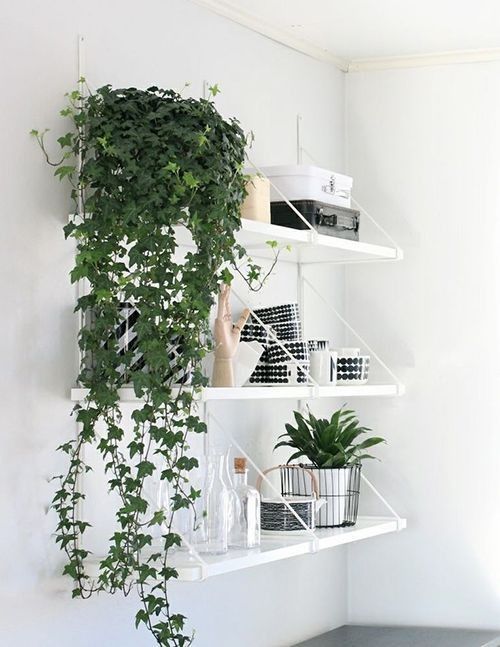
Source: Pinterest
Lucky plants #43: White clover
White Clover is renowned for its association with luck and abundance. Often considered a symbol of good fortune, its three leaves are believed to represent faith, hope, and love. Placing White Clover in the garden or indoors is thought to invite positive energy, creating a harmonious atmosphere filled with the promise of prosperity.
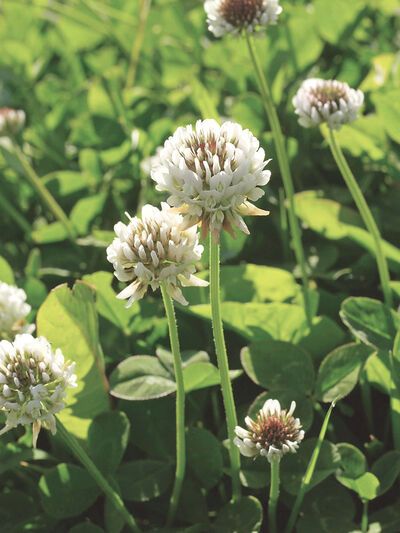
Source: Pinterest
Good luck plants for home #44: Echinacea
Beyond its recognised medicinal benefits, Echinacea is also regarded as a lucky plant. It is believed to enhance overall well-being and act as a protector against negative energies. The vibrant and resilient blooms of Echinacea contribute to a positive ambiance, making it a welcomed addition to any space.
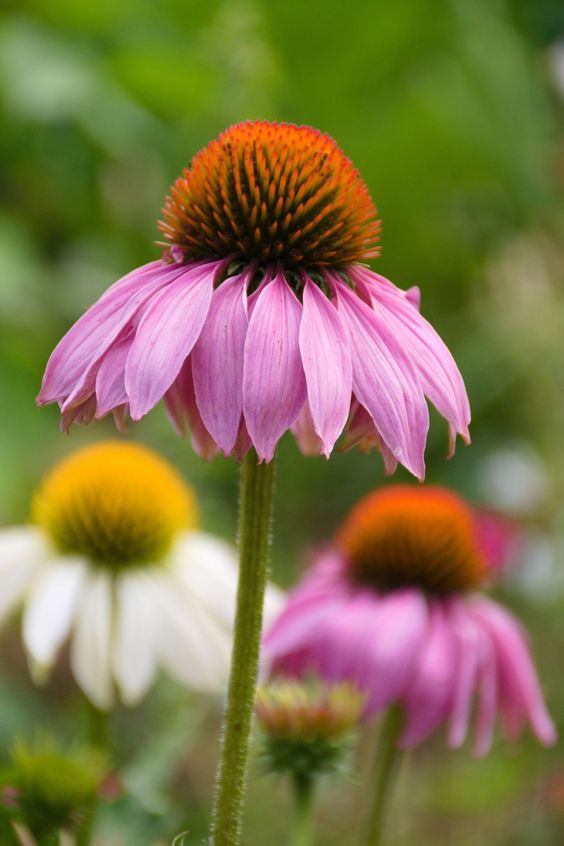
Source: Pinterest
Lucky plants for home #45: Hollyhock
Hollyhock, with its tall and majestic stalks adorned with colorful blossoms, is considered a symbol of prosperity. Planting Hollyhock around the home is believed to attract good fortune and positive energy. The presence of Hollyhock creates an environment of abundance and harmony, contributing to an optimistic and fortunate living space.
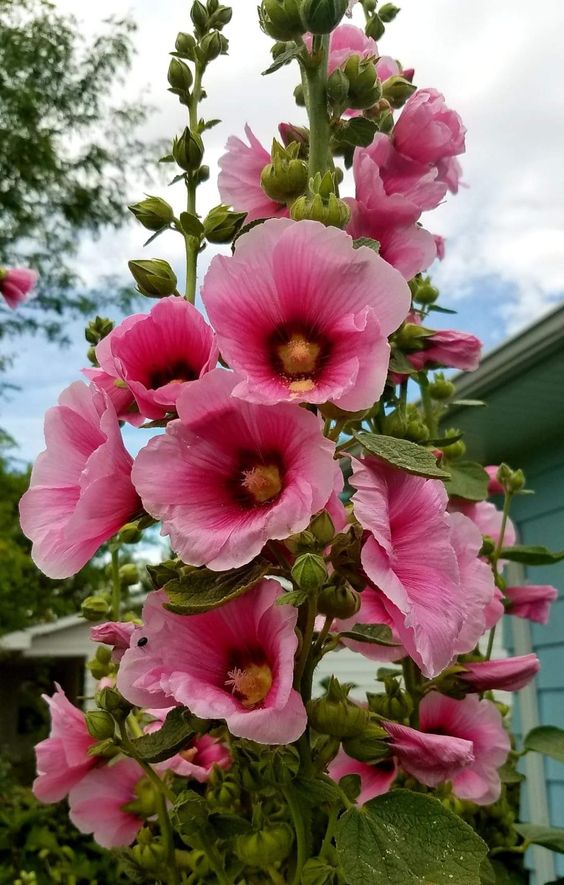
Source: Pinterest
Lucky plants #46: Lucky Shamrock
The Oxalis, commonly known as the lucky shamrock, is a popular plant associated with St. Patrick’s Day and is believed to bring good fortune. Its three-lobed leaves can be green or burgundy, and it produces delicate flowers that bloom for an extended period. Known for its longevity and minimal care requirements, it makes a great addition to any home.

Source: Ed’s Plant Shop (Pinterest)
Good luck plants for home #47: Pilea Peperomioides
Often referred to as the Chinese money plant, Pilea Peperomioides is renowned for its association with prosperity and good fortune. The plant’s round, glossy leaves resemble ancient Chinese coins, symbolising wealth and abundance. In Chinese culture, it is considered to attract positive energy and is commonly placed near sources of income or in wealth-enhancing areas according to Feng Shui practices.

Source: Amazon.com (Pinterest)
Lucky plants for home #48: Hoya Heart
Known as the Lucky Heart plant, Hoya heart is celebrated for its distinctive heart-shaped leaves. This plant symbolises love and affection and is seen as a protector against negative energy while attracting good fortune.
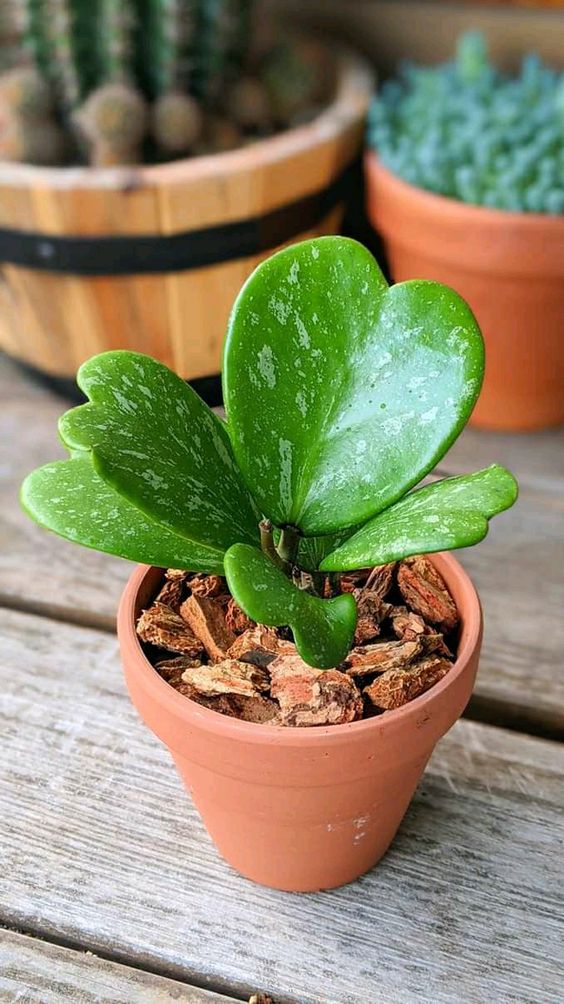
Source:Plants Bank (Pinterest)
Lucky plants #49: Rosemary
Rosemary (Rosmarinus officinalis) is a fragrant herb valued for its culinary and medicinal properties. Beyond its practical uses, rosemary is also considered a lucky houseplant. It is believed to repel negative energy and offer protection, making it a symbol of good fortune and safety in various cultures.
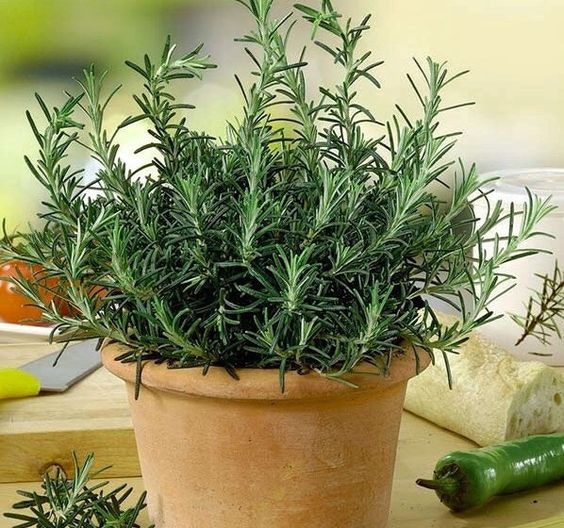
Source: Etsy (Pinterest)
Good luck plants for home #50: Aloe Vera
Aloe Vera is well-regarded for its healing properties and skincare benefits. It is also thought to attract luck and prosperity when kept indoors. According to Feng Shui, placing Aloe Vera in the East, South, or Southeast areas of your home enhances positive energy and contributes to a thriving environment.
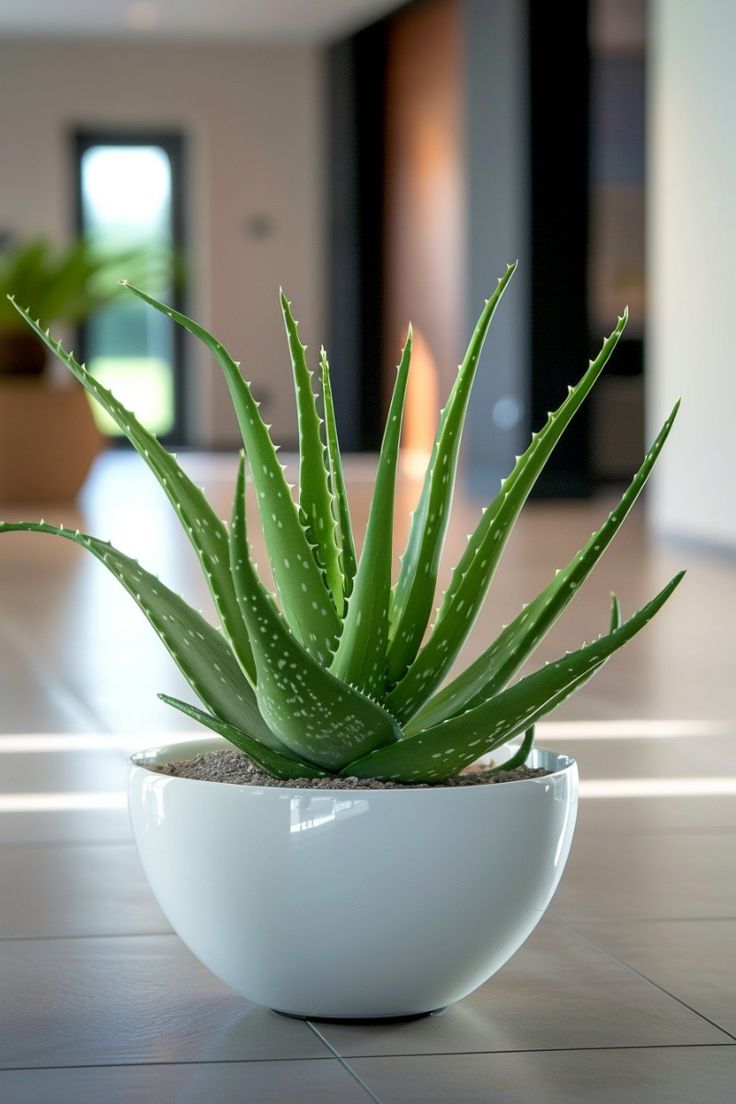
Source: Quiet Joy at Home (Pinterest)
Good luck plants for home: Benefits as per Vastu
According to vastu, some of the major benefits of keeping lucky plants at home include:
- Remove negative energies and attract positive energy.
- Maintain flow and balance of energy.
- Improve the health of family members.
- Influence the financial condition of the inhabitants.
Lucky plants for home: Vastu tips to remember
- Select healthy good luck plants for home with vibrant foliage, to create beneficial energy.
- Trees like neem and mango, provide good results in all directions.
- Champa, mogra and parijat should not be planted in the south-west, north-west or east directions.
- According to Vastu, trees in the garden should be planted in even numbers.
- For any house, it is auspicious to have a Gooseberry tree in the north-east direction, pomegranate in the north-west, banyan in the east, gular (cluster fig) in the south, peepul in the west and pakad (ficus) in the north direction.
- In your kitchen garden, besides growing turmeric which is associated with prosperity, grow herbs for good luck such as coriander, thyme and rosemary.
- According to Vastu, a citrus plant, besides emanating a fresh smell, helps in creating a happy atmosphere and thus is a good luck plant for home.
- Remove dried and decayed leaves, flowers and weeds, as they attract negative energy.
- Grow hibiscus, champa and marigold flowers in the garden at home as they are considered auspicious.
- Except for a few medicinal plants, avoid plants with thorns, as they give rise to tensions in the environment.
- Do not grow plants in chipped or cracked pots or vases.
- According to Vastu, growing creepers with support on the house wall, is not recommended.
Lucky plants: Feng Shui tips to remember
In Feng Shui, the ancient Chinese art of harmonising the energy in our surroundings, lucky plants are considered powerful tools to attract positive energy, wealth and good fortune into the home. Here are some Feng Shui tips to remember when incorporating lucky plants into your living space:
Placement of good luck plants for home
The placement of lucky plants plays a crucial role in Feng Shui. Here are a few guidelines to follow:
- Entrance area: Placing lucky plants near the entrance of your home is believed to invite positive energy and good luck into the house. Consider placing plants with vibrant foliage or auspicious flowers near the main door or foyer.
- Wealth corner: According to Feng Shui principles, the southeast corner of your home is considered the wealth corner. Placing lucky plants associated with wealth and abundance, such as the Money Plant (Pachira aquatica) or Jade Plant (Crassula ovata), in this area is believed to enhance financial prosperity.
- Balancing elements: Incorporate a balance of the five Feng Shui elements—wood, fire, earth, metal and water—when arranging lucky plants. For example, placing a bamboo plant (representing wood element) alongside a metal sculpture or decor item can create a harmonious energy exchange.
Consider health and vibrancy of lucky plants
Choose healthy and vibrant lucky plants for your home to ensure positive energy flow. Avoid wilted or dried plants, as they may attract stagnant or negative energy. Healthy plants with lush foliage and vibrant blooms symbolise vitality and abundance.
Avoid clutter and overcrowding
Maintain a clutter-free and well-organised space around your lucky plants. Clutter can obstruct the flow of energy and hinder the positive effects of the plants. Allow sufficient space for each plant to grow and thrive, avoiding overcrowding that may inhibit their energy-enhancing properties.
Symbolic representation
Consider the symbolic representation of lucky plants in Feng Shui. Some plants are believed to resemble specific aspects of life or bring forth certain qualities. For example, the Bamboo plant symbolises flexibility and resilience, while the Orchid represents love and fertility. Choose plants whose symbolic meanings align with your intentions or goals.
Intuition and personal connection
Trust your intuition when selecting lucky plants for your home. Connect with the plants on a personal level and choose ones that resonate with you and your energy. Consider your preferences, aesthetics and emotional connection to the plants to create a harmonious environment.
How to choose the right lucky plants for home?
When it comes to selecting lucky plants for your home, it’s important to consider a few key factors to ensure the best results. By taking these factors into account, you can choose the right plants that align with your energy, space and specific intentions.
- Light requirements: Different plants have varying light requirements, ranging from low light to bright, indirect light. Assess the lighting conditions in your home and choose plants that thrive in those specific conditions. This will ensure that your lucky plants receive the optimal amount of light to grow and flourish.
- Space availability: Consider the available space in your home when choosing lucky plants. Determine whether you have ample floor space for larger plants or if you need to opt for smaller plants that can be placed on shelves or countertops. Additionally, consider the height and spread of the plants to ensure they fit well in the designated area.
- Maintenance and care: Evaluate your ability to care for plants and choose ones that align with your level of commitment. Some plants require more attention and care, while others are more low-maintenance. Consider factors such as watering frequency, pruning needs, and humidity requirements to ensure you can provide the necessary care for your chosen lucky plants.
- Symbolic meaning: Different plants hold symbolic meanings and are associated with specific intentions or energies. Research the symbolic significance of various lucky plants and choose ones that resonate with your goals and desires. For example, some plants are believed to attract wealth and prosperity, while others promote love and harmony.
- Compatibility with household members: Take into account any allergies or sensitivities that household members may have to certain plants. Ensure that the chosen lucky plants do not pose any health risks or discomfort to anyone living in the house. If allergies are a concern, opt for hypoallergenic plants or those with minimal pollen production.
- Personal preference: Ultimately, choose lucky plants that you personally connect with and enjoy having in your home. Consider your aesthetic preferences, as well as any personal associations or memories associated with specific plants. Having a positive emotional connection with your lucky plants can enhance their energy and the overall ambiance of your home.
Which is the ideal good luck plant for you?
Choosing the right lucky plant for your home depends on the specific benefits you’re seeking. Whether you aim to enhance health, attract wealth, or foster harmony, different plants offer unique advantages. Use the following table to identify which lucky plants align with your goals and bring the most positive energy into your living space.
| Benefits | Lucky plants |
| Health | Tulsi (Holy Basil), Eucalyptus, Ginseng Ficus, Aloe Vera, Mint, Ginger, Ajwain (Carom), Thyme, Lemon Balm, Neem Tree, Chamomile |
| Wealth | Jade Plant, Money Plant, Rubber Plant, Golden Pothos, Citrus Trees, Adenium, Peepal Bonsai, Magnolia (Champak), Banana Tree, Coconut Tree, Amla Tree, Tangerine Tree, Pilea Peperomioides |
| Harmony | Lucky Bamboo, Peace Lily, Lotus, Rose, Jasmine, Ivy, White Clover, Hoya Heart, Chamomile |
| Prosperity | Lucky Bamboo, Money Plant, Rubber Plant, Golden Pothos, Adenium, Peepal Bonsai, Hibiscus, Magnolia (Champak), Jackfruit Tree, Pilea Peperomioides, Hoya Heart |
| Good fortune | Tulsi (Holy Basil), Jade Plant, Lucky Bamboo, Money Plant, Fortune Plant (Corn Plant), Lavender, Snake Plant, Golden Pothos, Rose, Peonies, Chrysanthemum, White Clover, Lucky Shamrock |
| Protection | Tulsi (Holy Basil), Snake Plant, Pitcher Plant, Sage, Ivy, Neem Tree, Hollyhock, Lucky Shamrock |
| Positive energy | Lucky Bamboo, Snake Plant, Lavender, Golden Pothos, Peepal Bonsai, Chamomile, Echinacea, White Clover, Hoya Heart |
| Healing | Eucalyptus, Aloe Vera, Ginger, Ajwain (Carom), Rosemary, Chamomile, Sage, Mint, Thyme, White Clover, Echinacea |
Care tips for lucky plants
Here are some plant maintenance tips you can follow:
- Regularly water your plants.
- Check soil moisture levels carefully.
- Use room temperature water for watering.
- Provide plants with adequate artificial or natural light.
- Consider using a humidifier if necessary.
- Use fertilisers to provide essential nutrients for plants.
- Maintain regular pruning of plants.
Common mistakes to avoid when choosing lucky plants for home
Choosing lucky plants for your home can be a fun and fulfilling process, but it’s essential to avoid certain common mistakes that could diminish the plant’s positive effects or make it difficult to care for. Here are some key mistakes to watch out for:
- Ignoring the plant’s environmental needs: Many people fall into the trap of choosing plants based solely on their appearance or symbolic meaning, neglecting the specific care requirements of the plant. For example, a plant like the Jade plant thrives in bright, indirect light, while the Money plant prefers low light conditions. It’s crucial to ensure the chosen plant is suited to the climate and lighting conditions of your home.
- Overwatering or underwatering: Overwatering or underwatering can harm your plants and negate their positive impact on the home. Some lucky plants, like the Snake plant, require minimal water, while others, such as the Peace lily, need more frequent watering. It’s important to research each plant’s watering needs to maintain its health and vitality.
- Not considering the size of the plant: Choosing a plant that’s too large or too small for your space can disrupt the harmony of your home. A large plant like the Areca palm may look beautiful but may overwhelm a smaller living room. On the other hand, a small plant like the Lucky bamboo may get lost in a large room. Always consider the size of your home and the available space when selecting a plant.
- Placing plants in the wrong location: According to Vastu and Feng Shui, the placement of plants plays a crucial role in maximizing their positive effects. For example, placing a Money plant in the wrong corner can affect its luck-bringing properties. Ensure that you place your lucky plants in locations that complement the energy dynamics of your home—such as near windows for sunlight or in the right corners to activate good fortune.
- Not considering allergies or pets: Certain plants, like Jasmine or Lavender, can be aromatic and may trigger allergies in sensitive individuals. Additionally, some lucky plants, like the Aloe Vera or Peace Lily, are toxic to pets if ingested. Always check if a plant is safe for your pets or family members with allergies before bringing it into your home.
- Choosing plants based on trends: While trendy plants like the Snake plant or Lucky bamboo are popular, it’s important to choose plants that align with your personal beliefs or values. Different plants carry various symbolic meanings across cultures. For instance, while the Jade plant is a symbol of wealth, it may not resonate with everyone. Trust your intuition and select plants that feel right for your space and intentions.
- Neglecting proper potting and drainage: Plants need to be planted in pots that allow water to drain properly. A common mistake is selecting a beautiful pot without considering drainage holes, which can lead to waterlogging and root rot. Ensure the pot has proper drainage and is the right size for the plant’s root system.
- Underestimating maintenance effort: While lucky plants are known for their positive effects, they still require proper care and maintenance. People often choose plants without considering the time and effort required to care for them. If you’re not ready to dedicate time for regular care, opt for low-maintenance plants like the Snake plant or Rubber plant.
Guide for gifting lucky plants
Lucky plants make the perfect gifts for any occasion. Not only do they purify the air around us but are also believed to bring good luck, wealth, health, love and positivity. What better way to show someone you care than by giving them a gift that can potentially improve their life?
Some traditional lucky plants include the Lucky Bamboo plant, known for bringing peace and fortune; and the Money Plant, which is said to bring prosperity and good luck. These plants are often used in Feng Shui and have significance in many Asian cultures. They are a popular choice as housewarming gifts or for business grand openings to symbolise a prosperous journey ahead.
Another well-known lucky plant is the Jade Plant. It symbolises growth and renewal, and is thought to bring financial success. It’s an ideal gift for someone starting a new job or business. Also, there’s the Snake Plant, which is famous for its air-purifying abilities and is believed to provide protective energy to its surroundings.Lastly, the ZZ Plant is another lucky plant considered an emblem of friendship and loyalty – the perfect gift for a dear friend. It’s also easy to care for, making it a great choice for busy individuals or those new to keeping plants.
Giving a lucky plant as a gift is not just about the belief of good luck that comes with them. It’s also about wishing your loved ones well-being, happiness and prosperity in all aspects of their lives.
Housing.com POV
Incorporating lucky plants into your home can significantly enhance the ambiance and promote positive energy, according to principles from Vastu Shastra and Feng Shui. These plants not only add beauty to your living space but also have the potential to bring prosperity, health and good fortune. From traditional favourites like the Money Plant and Lucky Bamboo to fragrant blooms like Jasmine and Orchids, there is a wide variety of plants to choose from, each with its unique symbolic meaning and benefits. By following simple guidelines for placement and care, you can harness the positive energies of these plants and create a harmonious environment that fosters success and well-being for you and your loved ones. Whether you’re selecting plants for your own home or choosing them as thoughtful gifts for others, the presence of lucky plants serves as a constant reminder of positivity, abundance and the potential for growth in every aspect of life.
FAQs
Where should I keep the bamboo plant at home?
You can place the bamboo plant in a place in the house that received low and indirect light.
Which plants are unlucky for home?
Avoid cacti and plants that have thorns.
Are Fake Plants bad luck?
As per Feng Shui, artificial plants are not good.
Is it lucky to grow bonsai at home?
Bonsai plants should be kept in the garden or verandah and not inside the house. According to Vastu, bonsai stands for stunted growth and so, it should not be kept indoors.
Which plants and trees bring bad luck and should not be grown at home?
According to both Vastu and Fengshui Tamarind, Mehendi, cotton, date palm and babul are not auspicious to be grown at home. Never keep dead and withered plants at home.
Which is the luckiest plant for home?
Some of the luckiest plants to keep at home are the Jade Plant, Holy Basil or Tulsi, Citrus Tree and Money Tree or Pachira Aquatica. Other popular plants regarded among the luckiest plants are Peace Lily, Snake Plant, Rubber Plant, Lavender, Blue Singapore Orchid, Eucalyptus, and Desert Rose.
Can we place Vastu plants for home in bedrooms?
It is advisable to avoid keeping the lucky plants in bedrooms. However, some plants such as Bamboo, Peace lily, Jasmine, and Lavendar can be placed in a bedroom.
Which plant attracts money?
Ferns are considered plants that can attract money and invite luck, according to Feng Shui experts. They are also among the easiest plants to care for.
Is snake plant lucky?
Yes, according to Feng Shui teachings, snake plants are believed to bring luck, prosperity, and positive energy.
Which plant attracts positive energy as per Vastu?
According to Vastu principles, coconut, lemon and pine trees are considered to have a positive influence on health and the environment. They are believed to bring positive support. Additionally, a sandalwood tree is considered auspicious.
Which plants bring success?
Some of the best plants to attract success include Money plant, Jade plant, Tulsi plant, Lucky bamboo and Rubber plant.







